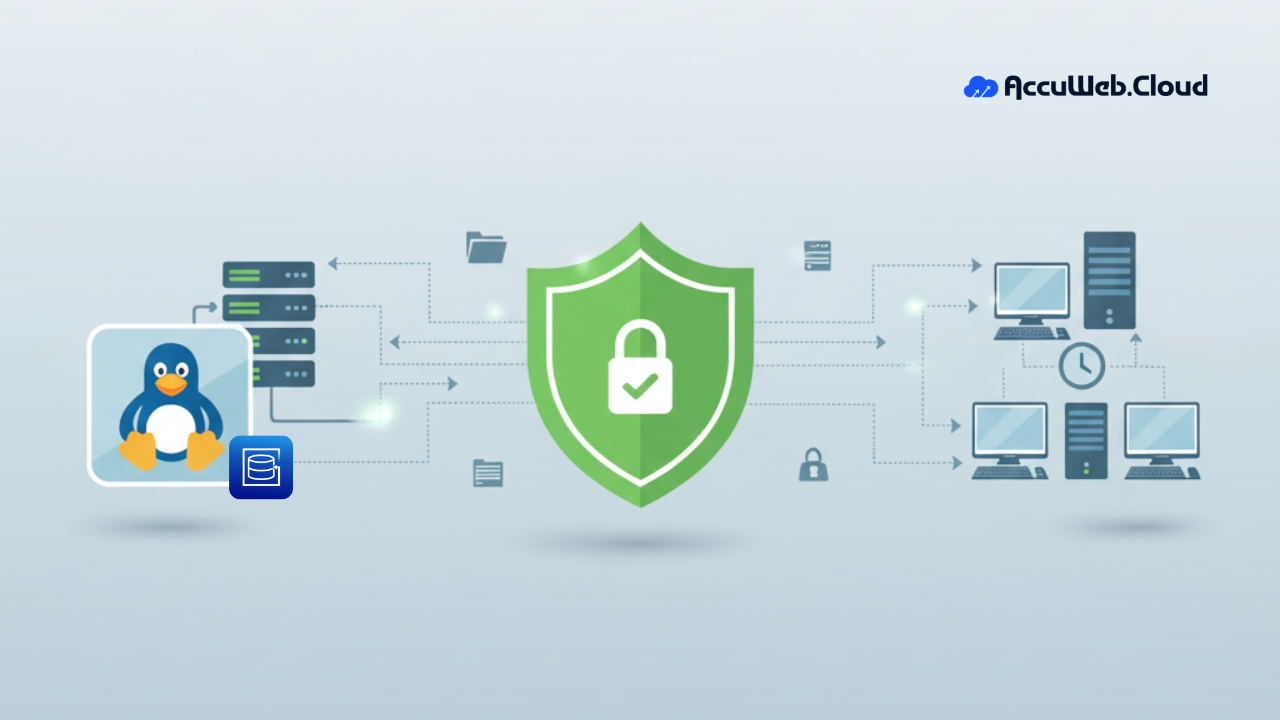UrBackup on Linux: A Complete Guide to Easy, Fast & Reliable Backups (2026)
TL;DR
- UrBackup is a client-server backup system that performs incremental and full image backups without interrupting active sessions.
- Web dashboard access allows central control of clients, backup scheduling, restore actions, and storage allocation without CLI complexity.
- Incremental deduplication stores only changed data to reduce backup windows and long-term storage usage across multiple devices.
- Clients connect over LAN or internet and support Linux, Windows, and NAS targets for unified fleet backups.
- Backup policies can trigger full, differential, or incremental runs manually or on schedule, with progress and logs visible in the dashboard.
Whether you’re managing personal files or backing up a network of devices at work, UrBackup is one of the simplest, most effective tools you can use. It offers fast file and image backups with an intuitive web dashboard, and it’s completely free.
In this guide, you’ll learn what UrBackup is, why it’s useful, and how to install and configure it on a Linux system.
Why Choose UrBackup?
UrBackup is a client-server backup solution that works quietly in the background. It protects your important files and entire system images without interrupting your daily work.
Key Benefits:
- Fast Incremental Backups: Detects file changes and only backs up what’s new.
- Runs While You Work: No need to close programs – UrBackup even handles open files.
- Web-Based Dashboard: Monitor backups, manage clients, and restore files all from your browser.
- Saves Storage Space: Identical files across multiple computers are backed up only once.
- Supports Remote Devices: Back up laptops or work-from-home devices over the internet.
- Free & Open Source: Licensed under AGPLv3+, suitable for both personal and commercial use.
- Cross-Platform Support: Works on Linux, Windows, FreeBSD, and some NAS systems.
Where UrBackup Works Best
| Environment | Use Case |
| Offices | Daily backups of employee PCs and laptops |
| Schools | Scheduled backups for lab and admin computers |
| IT Support Teams | Backup and restore across multiple client machines |
| Home Users | Simple, local NAS or PC backups without the cloud |
Installing UrBackup Server on Ubuntu Linux
Step 1: First, log in to your Ubuntu server.
Step 2: Once logged in, update your system by running:
# apt updateStep 3: Install some necessary tools that will help during the installation:
# apt install curl gnupg2 software-properties-common -yStep 4: UrBackup is not available in Ubuntu’s default software list, so we need to add the official source (PPA) provided by the UrBackup developer:
# add-apt-repository ppa:uroni/urbackupStep 5: Update the system again and install the UrBackup server:
# apt update# apt install urbackup-server -yDuring installation, it will ask you where to store backup files. By default, it uses /media/BACKUP/urbackup. You can accept this or change it to another folder. Just press TAB and then ENTER to continue with the default.
Step 6: Now, we need to access the Urbackup dashboard. UrBackup uses these two ports:
- 55414 (web interface)
- 55413 (client communication)
Now open your browser and go to:
http://your-server-ip:55414
You’ll see the UrBackup dashboard, where you can manage and monitor backups easily.
Create an Admin User on UrBackup Server
UrBackup is installed and working, but by default, anyone can access it because there’s no login set up. To protect your backups, let’s create an admin user.
Steps:
Step 1: Open the UrBackup dashboard in your browser. Click on Settings -> Users -> Create User.
Step 2: Type in a username and password, then click the Create button.
Step 3: The new user will now appear in the user list on the dashboard.
This user can now log in and manage UrBackup securely.
Add a New Backup Client to UrBackup Server
Now that your UrBackup server is ready, you need to add a client — a computer whose files and folders you want to back up to the server.
Steps:
Step 1: Log in to the client system (the computer you want to back up).
Step 2: Run the command below to download and install the UrBackup client:
TF=$(mktemp) && wget "https://hndl.urbackup.org/Client/2.5.25/UrBackup%20Client%20Linux%202.5.25.sh" -O $TF && sudo sh $TF; rm -f $TFThis will download the Linux UrBackup client (version 2.5.25), install it, and clean up the downloaded file automatically.
Step 3: Select the snapshot mechanism which you want to use for backup. Here, we have selected 5 Use no snapshot mechanism.
Step 4 : Once installed, the client will connect to your UrBackup server and start sending backups based on your settings.
Set Up Client Backups in UrBackup
Now that the client is connected, the next step is to configure what you want to back up from that client using the UrBackup dashboard.
Steps:
Step 1: Open the UrBackup dashboard in your browser. You’ll see the client system listed under the Computer name. Make sure the client is connected to the same network.
Step 2: Click on the Settings tab.
Step 3: Select the client settings in the Settings tab.
- If you have only one client, you’ll see the Client settings screen directly.
- If you have multiple clients, you’ll get a dropdown menu to choose the client you want to configure.
Step 4: Select the client you want to set up from the dropdown list.
Step 5: Click on File Backups.
In the Default directories to backup field, enter the folder path(s) you want to back up.
- To back up more than one folder, separate paths using a semicolon (;).
Step 6: Once you’ve added the required folder paths, click Save to apply the settings.
Start a Manual Full or Incremental Backup in UrBackup
To manually start a backup in UrBackup, follow these easy steps:
Step 1: On the UrBackup dashboard, check the box next to the client computer you want to back up. Then click the down arrow next to it.
Step 2: Choose the type of backup you want:
- Incremental File Backup – backs up only new or changed files.
- Full File Backup – backs up everything, regardless of changes.
Step 3: After you click on your choice, the backup will begin.
The time it takes depends on how many files and how much data need to be backed up.
Step 4: You can check the progress under the Activities tab. You’ll also find logs of previous backups in the same section.
Conclusion
UrBackup gives you reliable, hands-off backups without the complexity of traditional solutions. Whether you’re backing up a single machine or managing a network of users, it delivers speed, transparency, and flexibility without costing a penny.
If you’re running a Linux-based setup and want peace of mind, setting up UrBackup is one of the smartest moves you can make.
Try it now. Keep your data safe without interrupting your work download and install UrBackup today with AccuWeb.Cloud.

Jilesh Patadiya, the visionary Founder and Chief Technology Officer (CTO) behind AccuWeb.Cloud. Founder & CTO at AccuWebHosting.com. He shares his web hosting insights on the AccuWeb.Cloud blog. He mostly writes on the latest web hosting trends, WordPress, storage technologies, and Windows and Linux hosting platforms.























